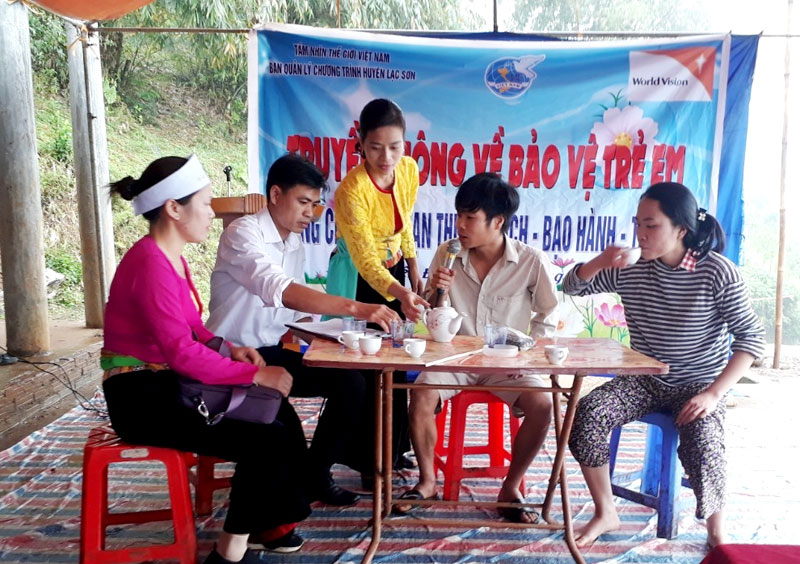
(HBO) – Between 2008 and 2018, Lac Son district saw 109 emotional and physical violence cases in families. The cases mostly happened in rural areas, involving people aging from 16-59, with the majority of victims being women. Forms of violence were both emotional and physical

The regional development programme of Lac Son in collaboration with the
district police and the Women’s Union of Mien Doi commune hold communication
activities on children protection and prevention of accidents, violence and
child marriage.
Reasons behind the situation vary from
poverty, jealousy to drinking. Violence affects all members in the family,
especially women and children. Since the promulgation of the Law on Domestic
Violence Prevention and Control, the number of violence cases in the district
has been reduced.
To deal with difficulties in the field,
the district has focused on giving professional training and interfering
capacity improvement to local officials as well as settlement of violations of
the Law on Domestic Violence Prevention and Control, while supporting victims
of domestic violence.
Specifically, over the past 10 years, the
district has held 11 training courses for 1,000 full-time and part-time local
officials in charge of family affairs of communes, towns and the steering
committee for domestic violence prevention and control, as well as head of
happy family clubs.
So far, all the 29 communes and wards of
the district have set up their steering committees for domestic violence
prevention and control and facilities to support victims of domestic violence,
along with 370 "sustainable development families” clubs, clubs for steering
committee for domestic violence prevention and combat, and 30 shelters for the
victims.
The district has organised 280
communication events at the district level, and over 2,000 other campaigns at the
communal and ward levels, attracting more than 550,000 officials and locals.
Communication forms have been diversified,
including panels, mobile radio, bulletins, and radio systems in communes and
wards. The efforts have helped minimise the number of domestic violence cases,
promoting the campaigns of building happy families and cultural families.
So far, 28,646 out of the 33,358 local
households have meet criteria for "cultural families”, reaching 85.8 percent.
The district has also developed 32 clubs of "happy family” with a membership of
over 300./.
The emulation movement "Hoa Binh joining hands to build new-style rural areas” has been widely spreading, becoming a driving force that motivates the localities to renew rural landscapes and improve the material and spiritual lives of the residents. In this movement, the people play a central role-both as the main implementers and direct beneficiaries of its outcomes.
In response to the global digital revolution, Hoa Binh Newspaper is transforming itself into a modern and multi-platform media hub, blending cutting-edge technology with a restructured newsroom and a new generation of tech-savvy journalists.
Hoa Binh province’s Association of the Elderly recently held a conference to review the project on expanding the inter-generation self-help club model until 2025.
In a move to implement Resolution No. 57-NQ/TW, issued on December 22, 2024 by the Politburo, which targets breakthroughs in science-technology development, innovation, and digital transformation, the Hoa Binh provincial Department of Health has issued a plan to roll out the "Digital Literacy for All” campaign within the local health sector.
An Nghia Commune (Lạc Sơn District) is one of the communes that achieved the tha standard of the national new rural area in 2018. Entering a new development phase, the commune is now trying to meet the criteria for the advanced new rural development. With the strong political will and the public consensus, the commune is gradually overcoming the challenges to reach this goal, aiming for the sustainable development.



